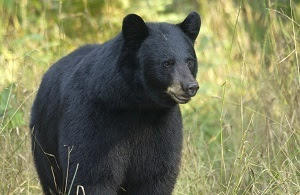Michigan: new bear population estimates available; first season starts Sept. 10

Michigan’s bear hunting seasons are almost here, with the first opening Sept. 10 in the Upper Peninsula, the Lower Peninsula’s first season starting Sept. 14 in select areas, and Sept. 16 for remaining locations below the bridge. Bear seasons have staggered openers with various locations and hunt periods. For each of the 2017 and 2018 hunting seasons, 7,140 bear licenses were available.
“Over half of the state is open to regulated bear hunting,” said Kevin Swanson, wildlife management specialist with the DNR’s bear and wolf program. “Hunters are an important part of managing the number of bear and where they are located, and they have been part of bear management in Michigan since 1925.”
Regulations governing how and when bear can be harvested are in place to sustainably manage the bear populations. “Regulations are how we control the take of bear, ensuring Michigan has a heathy population within suitable habitat. They are adjusted, if needed, every two years.
“We have the ability to influence the growth of bear populations in remote areas of Michigan. Habitat is not a limiting factor, but social tolerance has been reached in portions of the Lower Peninsula,” Swanson said. “We are discussing another increase in harvest in the northern Lower Peninsula.”
Watch a video on bear habitat.
The state’s current population is estimated at 14,000 adult black bear – almost 11,000 in the Upper Peninsula and nearly 3,000 in the northern Lower Peninsula. Several different scientific indicators, as well as public input, are used to determine harvest recommendations.
Hunters who were successful in drawing a bear license for the bear management unit they chose will have a good chance at harvesting a bear, with success rates generally from 25 percent to 60 percent. Millions of acres of public land are accessible to bear hunters, though many choose to hunt on private land. A bear license can be used on either land type within a particular bear management unit.
Learn more about the bear preference point system and how to get a license or contact Kevin Swanson at 906-458-1889.






